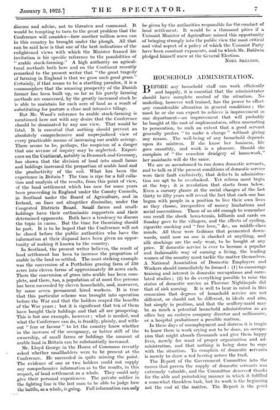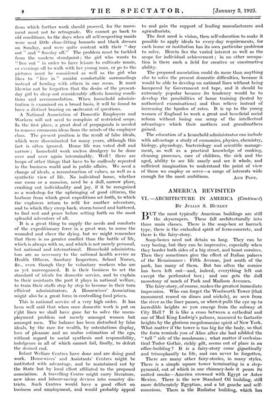HOUSEHOLD ADMINISTRATION.
.BEFORE any household staff can work efficiently and happily, it is essential that the administrator should have complete control of the situation. No underling, however well trained, has the power to effect any considerable alteration in general conditions ; the most .he or she can expect to achieve is improvement in one department—an improvement that will probably be bought at the cost of unpleasantness, often amounting to persecution, to such an extent that a good servant generally prefers " to make a change " without giving any reason. The well-being of any household depends upon its mistress. If she know her business, life ,goes smoothly, and work is a pleasure. Should she complain of " the ceaseless drudgery of housework," her assistants will do the same.
We are so accustomed to run down domestic servants,, and to talk as if the present conditions of domestic service were their fault exclusively, that defects in administra- tion are apt to be overlooked. Yet reform must begin at the top ; it is revolution that starts from below. Even a cursory glance at the social changes of the last thirty to fifty years will reveal the fact that each one has begun with people in a position to live their own lives as they choose, irrespective of money limitations and social conventions. Those of us old enough to remember can recall the shock lawn-tennis, billiards and cards on Sunday gave to the villagers, and the effects of cycling, cigarette smoking and " free love," &c., on middle-class .minds. All these were fashions that permeated down- wards, until now no one is shocked at anything,. and silk stockings are the only wear, to be bought at any price. If domestic service is ever to become a popular and fashionable way of earning a living, the leading women of the country must tackle the matter themselves. A National Association of Domestic Employers and Workers should immediately be formed : (1) to encourage training and interest in domestic occupations and corre- lated studies ; (2) to do everything possible to raise the status of domestic service as Florence Nightingale did that of sick nursing. It is well to bear in mind in this connexion that degrees of household service are not different, or should not be different, in ideals and aim, but simply in position, and that the scullery-maid may be as much a potential household administrator as an office boy an embryo company director and millionaire, or a hospital probationer a possible matron.
In these days of unemployment and distress it is tragic to know there is work crying out to be done, an occupa- tion that might absorb thousands and give them happy lives, merely for want of proper organization and ad- ministration, and that nothing is being done to cope .with the situation. To complain of domestic servants is merely to draw a red herring across the trail.
The Report of the Government Committee into the causes that govern the supply of domestic servants was extremely valuable, and the Committee deserved thanks for the able and painstaking manner in which it fulfilled a somewhat thankless task, but its work is the beginning not the end of the matter. The Report is the point from which further work should proceed, for the move- ment must not be retrograde. We cannot go back to old conditions, to the days when all self-respecting maids wore neat little close-fitting bonnets and black dresses on Sunday, and were quite content with their " day out " and " Sunday off." The problem must be tackled from the modern standpoint ; the girl who wants to "-live out " in order to have leisure to cultivate music, or evenings off to walk with her young man, or go to the pictures must be considered as well as the girl who likes to " live in " amidst comfortable surroundings instead of herding with others in one room. It must likewise not be forgotten that the desire of the present- day girl to sleep out considerably affects housing condi- tions and accommodation. When household adminis- tration is examined on a broad basis, it will be found to have a distinct bearing on undreamt of questions.
A National Association of Domestic Employers and Workers will not need to complain of restricted scope. In the first place, a great deal of propaganda is needed to remove erroneous ideas from the minds of the employer class. The present position is the result of false ideals, which were disseminated for many years, although this fact is often ignored. Home life was voted dull and narrow ; household work useless drudgery to be done over and over again interminably. Well ! there are heaps of other things that have to be endlessly repeated in the business world and in public affairs. We need a change of ideals, a reconstruction of values, as well as a synthetic view of life. No individual home, whether one room or a mansion, need be a dull, narrow place, crushing out individuality and joy, if it be recognized as a workshop for the upbringing of good citizens, the harbour from which great expeditions set forth, to which the explorers return to refit for another adventure, and to which they creep back, storm-tossed and battered, to find rest and peace before setting forth on the most splendid adventure of all.
It is a great thing to supply the needs and comforts of the expeditionary force in a great war, to nurse the wounded and cheer the dying, but we might remember that there is no greater conflict than the battle of life, which is always with us, and which is not merely personal, but national and international. Household administra. tors are as necessary to the national health service as Health Officers, Sanitary Inspectors, School Nurses, &c., even though they be voluntary workers who are as yet unrecognized. It is their business to set the standard of ideals for domestic service, and to explain to their assistants the part it plays in national welfare, to train their staffs step by step to become in their turn efficient administrators. A Housewives' Association might also be a great force in controlling food prices.
This is national service of a very high order. It has been well said that when once domestic work is put on right lines we shall have gone far to solve the unem- ployment problem not merely amongst women but amongst men. The balance has been disturbed by false ideals, by the race for wealth, by ostentatious display, love of pleasure and an undue estimation of the ego, without regard to social synthesis and responsibility, indulgence in all of which cannot fail, finally, to defeat the desired end.
Infant Welfare Centres have done and are doing good work. Housewives' and Assistants' Centres might be instituted with advantage, and be maintained not by the State but by local effort affiliated to the proposed association. A travelling Centre might carry literature, new ideas and labour-saving devices into country dis- tricts. Such Centres would have a good effect on business and employment, and would probably appeal to and gain the support of leading manufacturers and agriculturists.
The first need is vision, then self-education to make it possible to apply ideals to every-day requirements, for each home or institution has its own particular problems to solve. Herein lies the varied interest as well as the scope for individual achievement ; in no other occupa-' tion is there such a field for creative or constructive ability.
The proposed association could do more than anything else to solve the present domestic difficulties, because it would be able to develop on national lines without being hampered by Government red tape, and it should be extremely popular because its tendency would be to develop the possibilities of home training (tested by authorized examinations) and thus relieve instead of increasing the kirden of rates. It is up to the young women of England to work a great and beneficial social reform without losing one scrap of the intellectual advantages which their mothers and grandmothers gained.
The education of a household administrator can include with advantage a study of economics, physics, chemistry, biology, physiology, bacteriology and scientific manage- ment, as well as a practical knowledge of cooking, cleaning processes, care of children, the sick and the aged, ability to see life sanely and see it whole, and sufficient imagination to understand the point of view of those we employ or serve—a range of interests wide











































 Previous page
Previous page